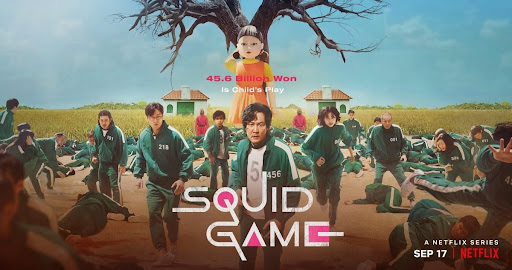Squid Game: Korea’s Hunger Games

Image courtesy of Gizmochina
By Jack Cherico
If you have been scrolling through Netflix recently, it would be hard to miss the South Korean drama, Squid Game. Squid Game, directed by Hwang Dong-hyuk, has taken the entertainment industry by storm and has claimed the number 1 spot on the US Top 10 list. It is the first Korean original series to do so and is challenging Netflix’s Bridgerton’s record of 82 million households watching the series, with 76 million households watching at least two minutes of the show in the first month of its release.
Discussions over Squid Game have blown up on the popular app TikTok. Netflix’s co-CEO Ted Sarandos said that “Squid Game will definitely be our biggest non-English-language show in the world, for sure.”
Squid Game is popular due to its strong acting performances, the meaning of the game the players are playing, and its relation to society, as well as the irresistible visuals.
Korean actors Lee Jung-Jae, Park Hae Soo, and Hoyeon Jung excel in their roles as players in the Squid Game. Watching the series with English subtitles while the audio remains in the native Korean language is the best way to see the outstanding acting.
The show takes 456 people, all of whom have struggled with debt, and gives them six children’s games. These games, such as red-light-green-light, are easy on the surface, but when the result, if you lose the games, is instant death, the tensions rise. The point of the game is to win 45.6 billion Korean won, which is about 38 million US dollars. However, the reason the players are there is a lot deeper.
Squid Game explores equality and the role prior circumstances have in life. The game leaders emphasize how the players are all given equal opportunity and a chance to erase their debts, which are realities the outside world has not given them. However, the Squid Game is inherently flawed. Though the game may be intended to promote equality, some of the games are left completely up to luck and can be out of the players’ control.
Furthermore, the game leaders explain how every contestant in the game has chosen to be there and signed a contract agreeing to the game. This may be technically correct, but when a person is put in a room with the walls closing in, and is given one way out, did they really have a choice? Most would say no, and this is the plight of the Squid Game contestants. They face either being killed by debtors or starving to death, so they choose the only way out given to them: the Squid Game.
The final aspect of Squid Game that has captivated so many viewers are the visual tricks that play with the viewer. The game takes place in a compound on a deserted island, yet the viewer, or the players, are never really given a chance to understand the surroundings. There is no concept of time, the rooms where the games are played seem endless, and the colors used in the rooms are bright and disorienting. This creates an environment geared towards binge-watching and draws viewers into watching the next episode as soon as the prior one ends.
Squid Game is another example of Korean media taking over the United States market. With a possible second season on the way, Squid Game is an excellent show to watch, and one that you cannot take your eyes off of.





